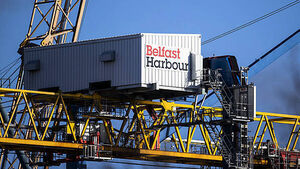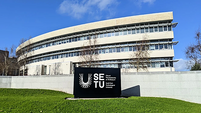Democratic oversight measures for NI Brexit rules are ‘insufficient’, peers find

By David Young, PA
Democratic oversight arrangements designed to give Stormont politicians and other stakeholders a say in post-Brexit rules in Northern Ireland are “overwhelmingly complex” and “impossible” to navigate, peers have found.
A House of Lords committee said the measures were “insufficient” and called for “urgent action” from the UK government to address the concerns.
The Northern Ireland Scrutiny Committee examined the scrutiny and engagement arrangements included in the Windsor Framework – the joint EU/UK accord that sets out post-Brexit rules for Northern Ireland.

To ensure no hardening of the Irish land border after the UK’s withdrawal from the European Union, Northern Ireland continues to follow many EU trade and customs rules.
The framework requires checks and customs paperwork on goods moving from Great Britain into the region.
It also includes a series of measures designed to address concerns that politicians and businesses in Northern Ireland have a limited role in influencing the post-Brexit rules that apply in the region.
This included the establishment of a dedicated committee at the Assembly to scrutinise EU law changes proposed to come into effect in Northern Ireland.
A mechanism called the Stormont Brake was also created. That allows a minimum of 30 Stormont MLAs, from at least two parties, to refer a proposed EU law change to the UK government.
The UK government then makes an assessment of the proposed change on Northern Ireland and can ultimately veto its application in the region.
If the UK government rules that the brake has been appropriately pulled, it must then directly engage with the EU to find a solution.
The committee of peers assessed the effectiveness of the committee and the brake, as well as a provision that allows stakeholders from Northern Ireland to attend certain joint UK-EU meetings.
The committee heard evidence from a range of witnesses, including the Federation of Small Businesses Northern Ireland, the Ulster Farmers’ Union and Northern Ireland Retail Consortium.
Among their findings, the peers concluded that post-Brexit arrangements remain “insufficiently understood” in Northern Ireland.
They made several recommendations that, they contend, will strengthen the region’s voice in the operation of the Windsor Framework and promote greater transparency.
The committee urged the Government to “urgently consider” how to simplify the framework arrangements, which it described as a “complex and opaque structure” that is difficult for business and civil society stakeholders to navigate.
It found a need to address difficulties faced by business due to the absence of a centralised register of applicable EU laws in Northern Ireland, which requires them to spend time and resources tracking developments on laws applicable to them.
The peers also found that the Government’s Trader Support Service for businesses trying to navigate the rules is “not providing a good quality of service”.
The committee recommended a new unit in the Cabinet Office responsible for regulatory divergence and a “one stop shop” where businesses can access relevant information about EU laws that apply in Northern Ireland.
Peers also expressed concern that the democratic scrutiny committee at Stormont does not have sufficient time or resources to effectively assess law changes proposed to the region. That was also a main finding in a recently published Government-commissioned review of the arrangements undertaken by Lord Murphy.
It was clear from the concerns raised by businesses, civil society and political representatives – both in formal evidence and during our visit to Newry and Belfast – that the democratic deficit in Northern Ireland remains unresolved.
The committee said the Stormont Brake was a “highly political topic” and peers noted the view expressed by some witnesses that the mechanism was “oversold”.
They urged the Government to be “more transparent” about the function of the brake so that it can be used “productively as a mechanism for promoting dialogue” between it and the Assembly.
Commenting on the report, Lord Carlile, chairman of the committee, said: “Our report comes at a pivotal moment for Northern Ireland and the UK. As the Government pursues a reset in UK-EU relations, it is vital that Northern Ireland’s voice is represented and heard.
“The potential agreements on sanitary and phytosanitary and energy arrangements could have significant implications for Northern Ireland’s place in the UK internal market, and for how the UK consults the EU on the application of EU law.
“We strongly support proposals to enhance Northern Ireland’s voice early in the EU legislative process, including through better resourcing of the UK Mission in Brussels and closer collaboration with the Northern Ireland Civil Service.
“It was clear from the concerns raised by businesses, civil society and political representatives – both in formal evidence and during our visit to Newry and Belfast – that the democratic deficit in Northern Ireland remains unresolved.
“Despite differing views among members, we agree that meaningful engagement, transparency, and public understanding must be urgently improved for the benefit of all communities in Northern Ireland.”




